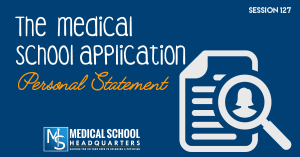You still have time to sign up with one of our amazing expert advisors! Learn More!

Today’s episode is meant to help you figure out how to write your medical school personal statement.
If you have access to a great premed advisor at your university, utilize them because they know your individual circumstances a lot better than we do. But if you’re in a situation where, being a nontraditional student, you find it difficult to get access to a premed advisor or perhaps if you’re at a larger university and you’re not in touch with your premed advisor, we offer premed advising services here at Medical School Headquarters.
In this webinar, we talk about the A-Z of personal statements. There are a lot of misunderstandings about what the medical school personal statement should do, so listen to this webinar to help shed light on your questions.
The majority of personal statements do more to hurt an application than to help an application.Click To TweetYou should have it done around May, so you can apply early in the application cycle. Start writing it two or three months before that.
A lot.
[Check out our Personal Statement Editing services.]
[Check out our Personal Statement Writing Course.]
Here are some of the mistakes we see premeds making over and over with their personal statements:
[Related episode: 5 Biggest Medical School Personal Statement Mistakes]
Email deans at osteopathic schools to get the best answer, as each school is going to be different. But at the end of the day, it’s about sharing your story and talking about why you want to be a physician, not why you want to be a DO or MD. So it doesn’t really matter. Generally, yes, you can use the same personal statement.
At the end of the day, the personal statement is about sharing your story and talking about why you want to be a physician.Click To TweetJust get everything out of your head. Just start writing it all down. Then you can mold and move things around from there. Get it out there. Just start, and it will trigger other meaningful memories you have. Pick a couple of the most meaningful experiences and start by developing those.

Lorem ipsum dolor sit amet, consectetur adipiscing elit
I just received my admission to XXXXX! This is unreal and almost feels like I am dreaming. I want to thank you for all of your help with my application. I cannot overstate how influential your guidance and insight have been with this result and I am eternally grateful for your support!
IM SO HAPPY!!!! THANK YOU SO MUCH FOR ALL YOUR HELP, IM INDEBTED TO YOU! Truly, thank you so much for all your help. Thank you doesnt do enough.
I want to take a few moments and thank you for all of your very instructive, kind and consistent feedback and support through my applications and it is your wishes, feedback, and most importantly your blessings that have landed me the acceptance!
I got into XXXXX this morning!!!! It still has not hit me that I will be a doctor now!! Thank you for all your help, your words and motivation have brought me to this point.
I wanted to once again express my heartfelt gratitude for your help in providing feedback during my secondary applications. Your guidance has been instrumental in my journey.
Just wanted to share my wonderful news! I received my first medical school acceptance! Thank you for all that you do for us Application Academy!!!
I am excited to tell you that I just got my third interview invite from XXXXX today! I can’t believe it. I didn’t even know if I was good enough to get one, let alone three – by mid-September. Thank you so much for all of your help and support up to this point; I would not be in this position without it!!
I wanted to thank you for helping me prepare for my XXXXX interview. Even in a 30-minute advising session, I learned so much from you. Thank you for believing in me, and here’s to another potential success story from one of your advisees!
I just received an acceptance with XXXXX! This is so exciting and such a huge relief and so nice to have one of our top choice schools! I also received an interview with XXXXX which brings the total up to 20 interviews! Thank so much, none of this would have been possible without you!

Join our newsletter to stay up to date
* By subscribing you agree to with our Privacy Policy and provide consent to receive updates from our company.
Resources
Advising Services
Podcasts & Youtube
Books
About
"*" indicates required fields